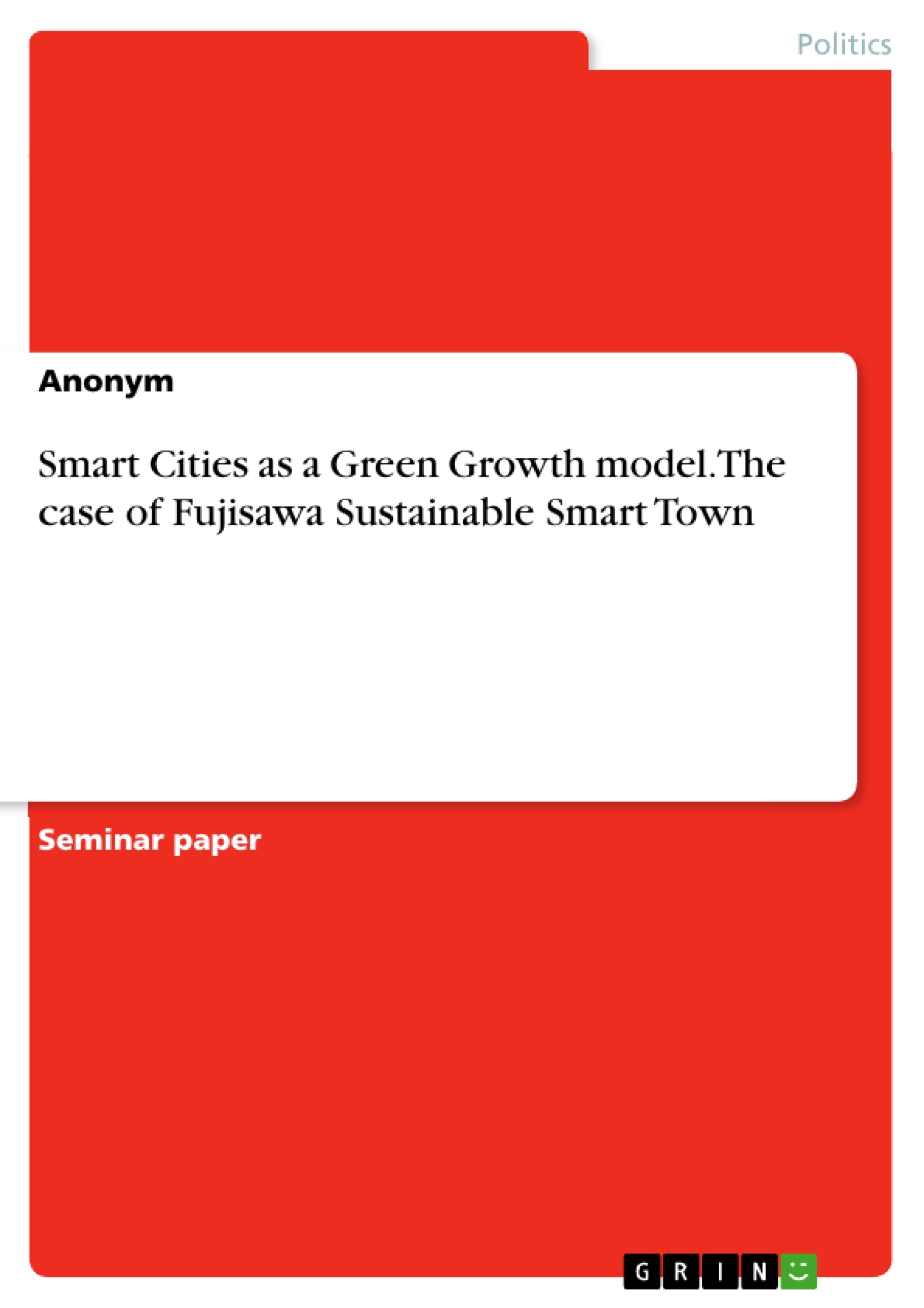As larger cities can struggle with implementing their Smart City development ideas due to their sheer size, this paper shall take a look at the case of Fujisawa Sustainable Smart Town. Fujisawa Sustainable Smart Town is a project lead by Panasonic, with the goal of constructing a small scale Smart City for roughly 1000 households in Kanegawa prefecture, Japan.
The initial time-frame of the project ranged from 2011 to 2018. The analysis for the Smart City project shall look at the development of Fujisawa during and after this time-frame. To create a basis for analysis, firstly the Green Growth model will be looked at with a short overview and possible criteria derived from it. As secondary criteria the concept of Smart Cities will be presented, starting with a short outline of the concept and following up with a small analytical framework. These criteria shall then be applied to the case of Fujisawa SST, with the main focus lying on the Green Growth Model. Finally the results and possible implications for other cities will be summed up.
Inhaltsverzeichnis (Table of Contents)
- Introduction
- A Green Growth Approach to Fujisawa's sustainable development
- An overview of the Green Growth Model
- Criteria of Green Growth
- Smart Cities' role in fighting Climate Change
- An overview of Smart Cities
- Criteria and restrictions for analysing Smart Cities
- A Green Growth Analysis of Fujisawa Sustainable Smart Town
- How Smart is Fujisawa Sustainable Smart Town?
- Does Fujisawa Sustainable Smart Town meet the criteria of the Green Growth Model?
- Conclusion
- References
Zielsetzung und Themenschwerpunkte (Objectives and Key Themes)
This paper aims to analyze Fujisawa Sustainable Smart Town, a small-scale smart city project in Japan, through the lens of the Green Growth model. The paper explores the potential of smart cities in combating climate change and achieving sustainable development.
- Green Growth model and its criteria for sustainable development
- Role of smart cities in fighting climate change
- Evaluation of Fujisawa Sustainable Smart Town based on the Green Growth model
- Implications of the analysis for other cities
- Potential of smart city initiatives to contribute to sustainable growth
Zusammenfassung der Kapitel (Chapter Summaries)
The paper begins by introducing the urgent need for sustainable development in light of pressing environmental challenges. It then delves into the Green Growth model, highlighting its principles and key criteria, such as resource efficiency and technological innovation. The concept of smart cities is presented as a potential driver of sustainable urban development, focusing on the integration of advanced technology for efficient resource management and improved quality of life.
The paper then examines the case of Fujisawa Sustainable Smart Town, a Japanese smart city project. It assesses the project's features and capabilities, focusing on its contribution to green growth objectives. The analysis explores the extent to which Fujisawa Sustainable Smart Town meets the Green Growth criteria, analyzing its success in areas like resource efficiency, technological innovation, and social equity.
Schlüsselwörter (Keywords)
The paper focuses on the following keywords: Smart Cities, Green Growth, Sustainable Development, Climate Change, Fujisawa Sustainable Smart Town, Resource Efficiency, Technological Innovation, Urban Planning.
Frequently Asked Questions
What is Fujisawa Sustainable Smart Town (SST)?
Fujisawa SST is a small-scale smart city project in Japan, led by Panasonic, designed for about 1,000 households with a focus on sustainability and green growth.
What is the "Green Growth" model?
Green Growth is an economic model that fosters economic growth and development while ensuring that natural assets continue to provide resources and environmental services.
How do Smart Cities fight climate change?
They use technology to optimize energy consumption, reduce waste, improve public transport, and integrate renewable energy sources into urban life.
Does Fujisawa SST meet Green Growth criteria?
The analysis evaluates the town based on resource efficiency, technological innovation, and its ability to balance ecological goals with economic viability.
Can Fujisawa's model be applied to larger cities?
While successful on a small scale, the paper discusses the challenges of scaling such integrated smart city concepts to larger, more complex urban environments.
- Citation du texte
- Anonym (Auteur), 2022, Smart Cities as a Green Growth model. The case of Fujisawa Sustainable Smart Town, Munich, GRIN Verlag, https://www.grin.com/document/1243321



